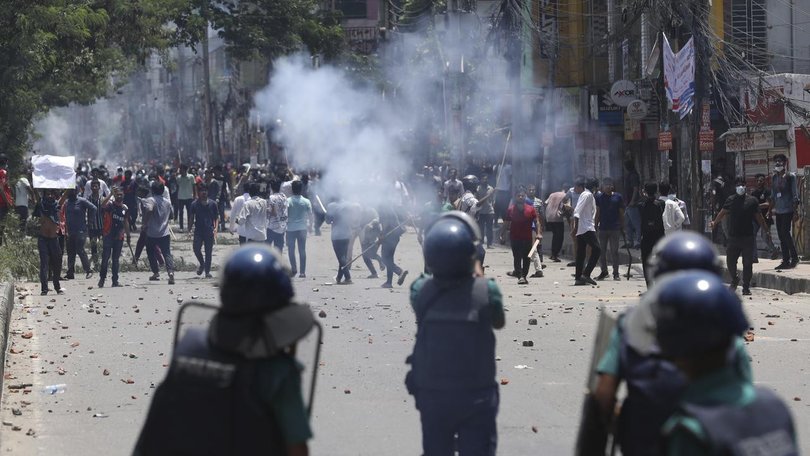Bangladesh authorities have deployed the army and imposed a curfew as over 100 die in protests
The Bangladesh government is sending in troops as more than 100 people died in violent student protests.

The Bangladesh government has decided to impose a curfew across the country and deploy the army, BBC Bangla reported, citing Prime Minister Sheikh Hasina’s press secretary, amid widening student-led protests against government job quotas.
An official decision regarding the curfew would be issued soon, the prime minister’s press secretary, Nayeemul Islam Khan, told BBC Bangla.
Three people were killed in the country on Friday as police cracked down on unrelenting student-led protests against government job quotas despite a ban on public gatherings, local media said.
Sign up to The Nightly's newsletters.
Get the first look at the digital newspaper, curated daily stories and breaking headlines delivered to your inbox.
By continuing you agree to our Terms and Privacy Policy.Police fired tear gas to scatter protesters in some areas, Reuters journalists said. One said he could see many fires across the capital Dhaka from a rooftop and smoke rising into the sky in several places.
Telecommunications were also disrupted and television news channels went off the air. Authorities had cut some mobile telephone services the previous day to try to quell the unrest.
Bengali newspaper Prothom Alo reported train services had been suspended nationwide as protesters blocked roads and threw bricks at security officials.
Violence on Thursday in 47 of Bangladesh’s 64 districts killed 27 and injured 1500.
The total number of those dead from the protests reached 105 on Friday night, AFP separately reported, citing hospitals. Reuters could not immediately verify the reports and police have not issued a casualty toll.
The US Embassy in Dhaka said that reports indicated more than 40 deaths and “hundreds to possibly thousands” injured across Bangladesh.
In a security alert, it said protests were spreading, with violent clashes being reported across Dhaka. The situation was “extremely volatile”, it said.
The protests initially broke out over student anger against quotas that set aside 30 per cent of government jobs for the families of those who fought for independence from Pakistan in 1971.
The nationwide unrest - the biggest since Hasina was re-elected this year - has also been fuelled by high unemployment among young people, who make up nearly a fifth of a population of 170 million.
Violence linked to the protests also broke out in distant London, which is home to a large Bangladeshi population, and police had to quell clashes between large groups of men in the east of the British capital.
Friday began with the internet and overseas telephone calls being crippled, while the websites of several Bangladesh newspapers did not update and were also inactive on social media, and news broadcasters went off the air.
Some news channels displayed a message blaming technical problems, and promising to resume programming soon.
The official websites of the central bank, the prime minister’s office and the police appeared to have been hacked by a group calling itself “THE R3SISTANC3”.
“Operation HuntDown, Stop Killing Students,” read identical messages splashed on the sites, adding in crimson letters: “It’s not a protest anymore, it’s a war now.”
The government had no comment on the communications issues.
